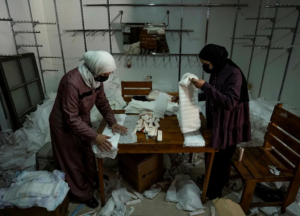This Women’s Day, Palestinian women in Gaza are making period products out of tents

Palestinian women sew diapers in Rafah, southern Gaza Strip, on February 15 2024
Nagham Zbeedat writes in Haaretz on 7 March 2024
International Women’s Day, which will take place on Friday [8 March], serves this year as a reminder of the women still suffering and fighting for their rights – not just because they are women, but because they are Palestinians in Gaza.
According to the international non-governmental organization ActionAid, Gaza is now one of the most dangerous places for women, with seven killed every two hours. On Friday, Gazan women will not be waiting for roses and empowering chants, but will instead be hoping that humanitarian aid enters the territory and the aerial bombardments cease.
With the ongoing war now in its fifth month, the situation in Gaza has grown increasingly dire. If accessing clean water was difficult before October 7, when some 90 percent of water from the faucet was not drinkable, it is now nearly impossible. In this grim situation, girls and women are also increasingly unable to wash their hair. Instead, they have resorted to cutting it off or shaving their heads to prevent diseases.
“I had to shave my head because I have no water to wash my hair,” a 49-year-old mother, Nisreen, told Middle East Eye from her tent in the al-Mawasi area in south Gaza. “I also did the same to my 16-year-old daughter and my 12-year-old son, to protect them from scalp diseases, as their friends developed scalp ringworm,” she added.
Gazan activist Bisan Owda, known for her viral videos documenting life in the war-torn enclave, also cut off pieces of her hair after being unable to maintain it. In an emotional Instagram post, she shared a farewell, writing, “I love my hair so much! I love the gorgeous curls on my head but I couldn’t keep them! Today I cut a lot of my hair because it was damaged due to the lack of clean water and hair care products that I could not carry from my beautiful room!”
This desperate act by women in Gaza was copied by an Egyptian woman who had her head shaved on camera. “To all the women in Palestine, I’m sorry for all you are going through and for not knowing what [to do] and how I can help,” she told the camera. “I saw videos of women shaving their heads because they can’t find water to shower or even drink. I feel helpless,” she added, dedicating the video to Aaron Bushnell – the 25-year-old member of the U.S. Air Force who self-immolated in protest of the Gaza war – and Palestinian women.
Shaving their heads and cutting off beloved hair is not the only struggle women in Gaza are facing – on top of running from bombardment or trying not to starve. As Israel continues to block the necessary quantity of aid from entering Gaza, feminine hygiene products are becoming impossible to find.
If accessing clean water was difficult before October 7, when some 90 percent of water from the faucet was not drinkable, it is now nearly impossible.
At the start of the war, when period products were only difficult to obtain, women and girls used period-delaying pills as an alternative. Now five months in, these pills are being replaced, too – with scraps of the tents many displaced Gazans live in.
Pregnant women, too, facing a terrifying reality. In addition to the fear of delivering a baby in a war zone and being utterly helpless to save yourself or your newborn, enduring a cesarean section without anesthesia or proper medical supplies is a haunting prospect.
Yafa Abu Akar, a Palestinian woman taking shelter in Nasser Hospital – the only (barely) functioning hospital in Khan Yunis – told ABC News that a woman she knew had to have her womb removed after she delivered her baby due to heavy bleeding and a lack of proper medical equipment. With the right tools, the operation would not have been necessary. This young woman won’t be able to have another child, she said.
This Women’s Day, as the war drives the population in Gaza toward increasingly desperate measures, the resourcefulness and resilience of every Palestinian woman should be on display.
This article is reproduced in its entirety
